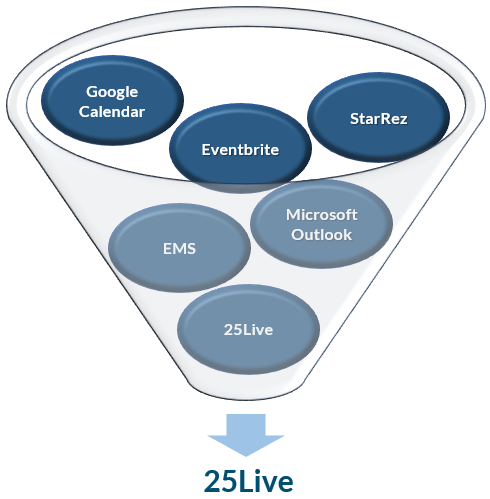Since 2019, the Executive Director of Quality Assurance & Audit Services and the Quality Assurance (QA) team have been working on improving the event scheduling process at SF State. The team has taken a holistic approach to assessing various event scheduling tools, conducting internal research with colleagues at SF State and our sister campuses, and collaborating with Event Professionals to compile reservation information of the most frequently requested on-campus spaces into the Event Venue Guide. The goal is to standardize the event request process onto a single platform, enhancing efficiency for all stakeholders.
Our Research

2017-2019
In 2017, QA and Information Technology Services (ITS) worked collaboratively with campus stakeholders to identify requirements for a non-academic event scheduling tool. Although no single application met all needs, 25Live satisfied over 80% of the identified requirements.
In 2019, with the guidance of senior leadership and ITS support, QA continued with the assessment efforts and took on a holistic approach to improve the coordination and planning of events on campus until 2020 when the project was put on hold due to the COVID-19 pandemic.
2023-Present
After a three-year hiatus, the cross-divisional Process Improvement Advisory Team reconvened in May 2023 and anonymously submitted 50 process improvement ideas. Among them, four proposals were centered around a unified event scheduling platform. As a result, QA resumed their research efforts and engaged with SF State event professionals and several CSU campuses to discuss best practices for event planning in the university environment.
The campus has implemented various systems for scheduling rooms and events, including EMS, Outlook, EventBrite, Brightly, and CollegeNET (25Live). Currently, campus event information and scheduling processes are scattered across multiple systems and, this fragmented approach, has resulted in inconsistent event coordination and communication and has contributed to a siloed approach to event planning among campus departments. Our research underscores the importance of assessing and implementing a unified event scheduling platform for improved efficiency. Below are the findings from our assessment.

QA resumed their assessment and developed a 204-point ranking system (with 68 criteria) for evaluating event scheduling tools: Platform Specifications (7 criteria), Event Scheduling and Management (7 criteria), Event Publishing (5 criteria), Analytics and Reporting (5 criteria), Communication and Notification (3 criteria), Document / Agreement (3 criteria), Dashboard (4 criteria), User Interface (3 criteria), Data Integration with University Systems (3 criteria), Training (2 criteria), Support (2 criteria), and Technical Requirements (24 criteria).
In February 2024, QA solicited proposals from three vendors. Of the three vendors, CollegeNET ranked first with 184 points and offered the most competitive pricing at $38,000 in ongoing costs, along with unlimited licenses for campus use. With its proven track record as an event scheduling solution in 12 other CSUs, CollegeNET stands as our chosen vendor, capable of meeting the majority, if not all, of the University's needs. Our assessment showed that 25Live, the robust web-based event calendaring, scheduling, and publishing system offered by CollegeNET, will streamline the coordination among campus departments/teams, clearly define roles & responsibilities, minimize duplications of effort, and optimize campus resources.
| CollegeNET | Vendor #2 | Vendor #3 | |
|---|---|---|---|
| Score (out of 204) | 184 points | 176 points | 148 points |
| Estimated Cost | $38,000 | $198,000 | $78,406.30 |
| Ongoing Cost (assume a 5% annual increase) | $34,059 | $207,900 | $64,739 |
- One unified platform to request and view inventory of available campus spaces.
- Provide a robust online application for event scheduling that works for students, staff, faculty and administrators.
- Foster cross-functional collaboration for effective planning and execution of events on campus.
- The tool will be designed to incorporate features that facilitate inclusivity and accessibility for all users.
- Clarify campus event scheduling processes and procedures.
- Enhance visibility of all campus events which will allow campus administration to ensure the safety of the SF State community.
- Provide the SF State community with an event space database, a streamlined event request process, and information on all planned events and activities on campus.
- The event request process will be a consistent and standardized approval workflow.
- Automated notifications will be sent to key stakeholders to facilitate event planning, response, coordination, execution, and communication.
- Enable the University to optimize its available resources.
Consultation
QA are actively engaging with essential teams, key stakeholders, and our sister campuses about current practices and challenges related to scheduling meetings and special events. This collaborative approach will guide our efforts in implementing the event scheduling tool that will address the University's needs.
Academic Resources;
Academic Technology (AT);
College of Ethnic Studies (CoES);
College of Health & Social Science (CHSS) ;
College of Liberal & Creative Arts (LCA);
College of Professional & Global Education (CPaGE);
College of Science & Engineering (CoSE);
Division of Graduate Studies;
Faculty Affairs & Professional Development;
Graduate College of Education (GCoE);
Institutional Analytics;
Lam Family College of Business (LFCoB);
Library;
Office of Research and Sponsored Program (ORSP);
Undergraduate Education and Academic Planning (DUEAP)
Budget Administration and Operations (BAO);
Capital Planning, Development, and Construction (CPDC);
Facilities Services;
Financial Services;
Human Resources (HR);
Housing, Dining, & Conference Services (HDCS);
Information Technology Services (ITS);
Procurement and Support Services;
Risk and Safety Services;
University Corporation (UCorp)
Associated Students (AS) Management;
Athletics;
Dean of Students (DOS);
Disability Programs and Resource Center (DPRC);
Division of Campus Safety;
Division of Disability Access & Student Well-being;
Division of Equity & Community Inclusion;
Division of International Education;
Division of Student Life;
Office of Vice President, SAEM
Alumni Relations and University Engagement;
Strategic Marketing & Communications (SMC)
Other Engagements
Next steps?
The event scheduling project officially kicked off on May 2024. The project will involve multiple campus teams across all divisions and will focus on meeting key milestones while ensuring smooth user adoption.
To stay up-to-date on key dates, milestones, and progress, please visit our Implementation Overview page. This page will be regularly updated with important information on deliverables and any changes to the timeline. We encourage all stakeholders to check it frequently to track the project’s progress and stay aligned with upcoming tasks and priorities.





